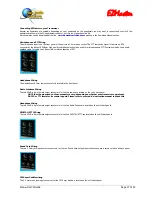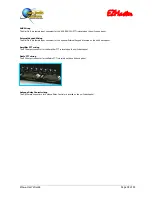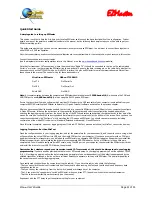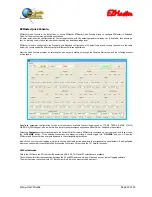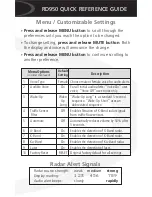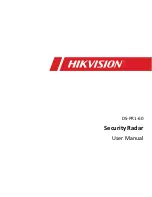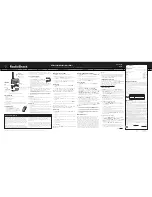
EZMaster
EZMaster
User’s Guide
Page 9 of 53
SO2R - Two-Radio Switching
Logging programs like Win-Test, NA, TRLog, WriteLog and CT offer the users the ability to switch between two radios. Two-radio
operation is becoming popular in the contesting arena, but individuals might also want to use this facility during DXpeditions or even for
casual operations.
EZMaster supports, in NORMAL and EXTENDED mode, the ability to control SO2R (Single Operator 2 Radio) functions with a single
cable from the computer’s LPT port. The signal, from the logging program, that drives the Radio A / Radio B switch is fed to EZMaster
which provides the relevant switching for the RX-audio, MIC-audio, CW-Out, FSK-Out, Digital-Out and PTTLine Out to the selected
radio.
The user can also override the radio selection through the front Panel or the External Keypad keys.
The ADVANCED mode CMI (Command Mode Interface) allows for even more control commands, like Antenna Relays Outputs
configuration, PTT delays and extended Voice Keyer PLAY/REC functions.
Audio Configuration
Several Audio modes are available by selecting them from the Front Panel or the External Keypad. In MANUAL MODE the audio switch
follows the radio selection, listening in both ears the active radio; a SPLIT command allows to connect each headphone’s ear-pad to
each radio; the REVERSE Command swap the SPLIT default. In AUTOMATIC MODE EZMaster latches both the headphone’s ear-pads to
the inactive radio, after a defined, user selectable, time delay, until the end of the “in progress” transmission. When the actual
transmission finishes, the headphones return to their previous setting (both ears on the active radio, or one ear on each radio). The
EZMaster receiver audio wiring is “stereo”, so the rigs with sub-receivers are fully supported and operators benefit from them.
Twin Headphones
EZMaster introduces the “Twin Headphone” feature, that allows two users to share one unit connected to 2 radios. This feature allows
both Headphones to be connected to both radios, in reverse mode, that is, Headphone-A is always connected to the active Radio, and
Headphone-B to the inactive Radio. Such an operating configuration allows you to use EZMaster in a Multi-Single / Multi-Multi
environment, easily passing mult’s between bands, or, using two radios, with two operators, during a split operation.
PC Interface
EZMaster has several interfaces to connect to the PC’s USB, LPT and COM ports. Depending on the type of the logging program and the
EZMaster operating Mode, the user only needs a standard USB cable or a pin-to-pin serial and/or parallel cable.
The USB port and COM port provide interfaces for the CW-key and PTT signals from a logging program as well as the PC connection,
for a Radio interface, to control the radio from the logging program itself.
The Parallel connector, on the back panel, provides the control of the first four Voice Keyer’s messages, the CW keying, the PTT and
Radio A/B switching from the computer and the Band Matrix data.
The pin used to control the Radio A/B switching differs between different contesting logging programs. TRLog, CT and WriteLog use pin
14 for the A/B switch, while NA uses pins 7,8, & 9 to provide a, slightly, more versatile switching arrangement. In the EZMaster
EXTENDED MODE, the Parallel port adds a new Voice Keyer feature allowing the playing and recording of all the 7 messages, including
also a STOP command.
Auxiliary PC Interface
The RS232 Port and the AUX Port, on the back panel, provide an extension to connect other serial devices, such as rotors, TNC’s, or
even the last radio’s generation. The AUX port allows a complete compatibility with FSK applications that need to work directly on the
TX pin.
User Interface
The EZMaster Front Panel supplies all the relevant information about its status in real time, through a back-lit LCD display and several
status LEDs. The Front panel keyboard, allows configuration of EZMaster and a direct access to the main commands, allowing the
maximum flexibility even with applications that don’t support all the EZMaster features.
Isolated Audio Output
The TX audio outputs, to Radio A and Radio B, are fully isolated, from the rest of the circuitry, with an audio transformer. One of the
transformer pins is fed through an audio capacitor to provide DC decoupling. The insulated transformer’s outputs minimize the chances
of ground loops and RFI. AFSK Inputs / Outputs are also fed into transformers, allowing a complete decoupling of the digital audio
interface. The user must, however, still ensure that proper grounding techniques are used, especially in high RF power levels
environments and where a PC port is also connected to the keyer.
PTT Output
EZMaster has a unique feature to avoid “hot switching” of RF amplifiers with slow changeover relays. The feature is available for both
radios. The PTT sequence can be controlled through four, independent, PTT lines, two of them used for both radios. The PTT lines are

















